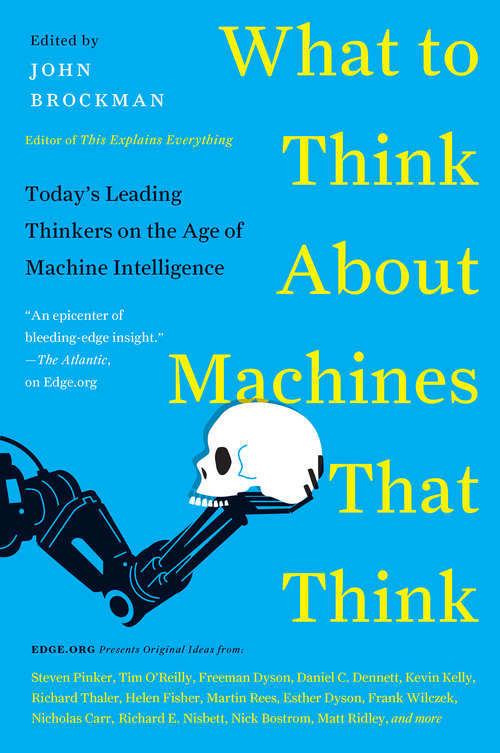What to Think About Machines That Think: Today's Leading Thinkers on the Age of Machine Intelligence
By:
Sign Up Now!
Already a Member? Log In
You must be logged into Bookshare to access this title.
Learn about membership options,
or view our freely available titles.
- Synopsis
-
As the world becomes ever more dominated by technology, John Brockman’s latest addition to the acclaimed and bestselling “Edge Question Series” asks more than 175 leading scientists, philosophers, and artists: What do you think about machines that think?
The development of artificial intelligence has been a source of fascination and anxiety ever since Alan Turing formalized the concept in 1950. Today, Stephen Hawking believes that AI “could spell the end of the human race.” At the very least, its development raises complicated moral issues with powerful real-world implications—for us and for our machines.
In this volume, recording artist Brian Eno proposes that we’re already part of an AI: global civilization, or what TED curator Chris Anderson elsewhere calls the hive mind. And author Pamela McCorduck considers what drives us to pursue AI in the first place.
On the existential threat posed by superintelligent machines, Steven Pinker questions the likelihood of a robot uprising. Douglas Coupland traces discomfort with human-programmed AI to deeper fears about what constitutes “humanness.” Martin Rees predicts the end of organic thinking, while Daniel C. Dennett explains why he believes the Singularity might be an urban legend.
- Copyright:
- 2015
Book Details
- Book Quality:
- Publisher Quality
- Book Size:
- 576 Pages
- ISBN-13:
- 9780062425669
- Related ISBNs:
- 9780062425652
- Publisher:
- HarperCollins
- Date of Addition:
- 10/13/15
- Copyrighted By:
- Edge Foundation, Inc.
- Adult content:
- No
- Language:
- English
- Has Image Descriptions:
- No
- Categories:
- Nonfiction, Science, Computers and Internet, Psychology
- Submitted By:
- N/A
- Usage Restrictions:
- This is a copyrighted book.
Reviews
Other Books
- by Mr John Brockman
- in Nonfiction
- in Science
- in Computers and Internet
- in Psychology
